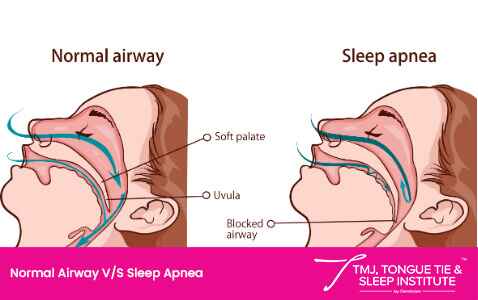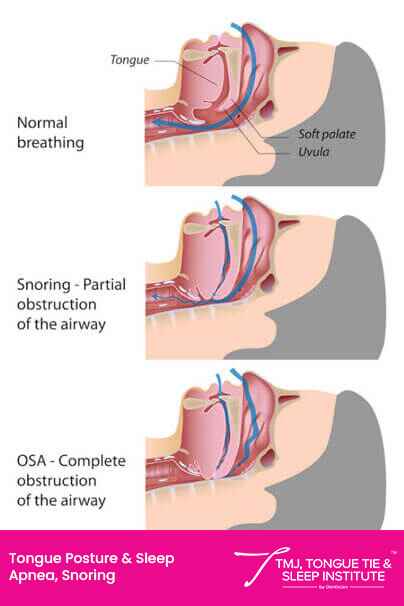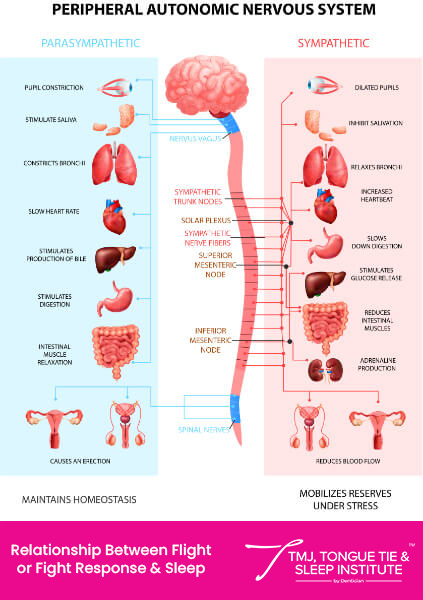SLEEP DISORDERS - OSA AND URAS
Sleeping Disorder Problem
Tongue Tie,
Snoring &
Sleep Apnea Causes

THE RELATIONSHIP

THE BREATHE-SLEEP CONNECTION
When you transition from a night of light sleep to deep sleep, all the muscles in the body begin to relax, including the soft palate and the tongue. Among these muscles, the soft palate and the tongue play an essential role in maintaining unobstructed airflow. Any obstructions in these areas can disrupt the velocity and pressure of airflow, which can lead to sleep disturbances.
Under normal circumstances, the tongue rests against the roof of the mouth naturally, helping to keep the airways open. This maintenance of airway patency is essential for enjoying a restful and uninterrupted night’s sleep without night breathing problems.
Sleep apnea is a type of condition characterized by the individual experiencing complete closure of the throat airway during sleep. This sleep apnea causes sleeping issues as the patient is constantly struggling to sleep.
This obstruction leads to a significant reduction in oxygen levels, imposing undue stress on both the heart and the body. As a result, individuals with sleep apnea encounter frequent night breathing problems, where they wake up gasping for air.

FIGHT OR FLIGHT RESPONSE & SLEEP
The parasympathetic nervous system in the body helps restore a calm and composed state. This prevents the body from overworking. On the other hand, the sympathetic nervous system, , prepares the body for fight and flight response. Your body goes into a sympathetic drive, i.e. the fight or flight response when one goes from deep sleep to light sleep to avoid that obstruction. With recurrence of these events hour after hour, these chronic sympathetic tone events cause fear and strain and makes them feel agitated, anxious. They remain in a high sympathetic drive until they reach a stage of adrenal fatigue where they don’t have any more cortisol left to fight it off and they feel very fatigued. UARS is a precursor to sleep apnea and it is the most predominant in people with a lot of compensations.
These sleeping disorder problems put our bodies in a constant sympathetic drive, which affects the eyes, inhibits salivation, increases the heart rate, and bronchial dilatation, which leads to chronic respiratory diseases, acid reflux, and digestion issues, insulin resistance leading to diabetes, etc.

INDIA'S LEADING SLEEP DENTISTRY & TONGUE TIE EXPERTS
CORRECT TONGUE POSTURE
ORAL MYOFUNCTIONAL THERAPY (OMT)
FUNCTIONAL FRENULOPLASTY (TONGUE TIE RELEASE)
BREATH RETRAINING
AIRWAY ORTHODONTICS
Frequently Asked Questions
An oral appliance is an advanced dental sleep device used to treat sleep apnea and snoring. This device works by repositioning your lower jaw to increase the airway and creating proper tongue space. These oral appliances work as an excellent alternative to invasive sleep apnea treatments.
If left untreated, sleep apnea can impact your everyday life significantly. Some of the side effects of untreated sleep apnea include low energy, mood swings, diabetes, high blood pressure and anxiety.
OUR ADVANCED & GLOBALLY RENOWNED TONGUE TIE PROCEDURES:
Blogs

The Link Between Tongue Tie and Gastroesophageal Reflux Disease (GERD)
I frequently meet patients who share a common concern: the question of whether their jaw pain,

What Happens If I Don’t Treat My Child’s Tongue-Tie?
As a parent, your child’s health and development are your top priorities. But what if something..

How Do Babies Feed After Tongue-Tie Surgery? A Complete Guide for Parents
When your baby struggles to breastfeed or bottle-feed, it can be very frustrating and emotional

How Tongue Tie Impacts Nutrition and Feeding in Children?
Have you ever noticed your baby struggling to latch while breastfeeding? Or maybe your child..

How Laser Frenectomy Helps Improve Breastfeeding for Newborns?
Breastfeeding is a beautiful and essential bonding experience between a mother and her newborn.

Innovative Advances in Tongue Tie Treatment: What’s New?
A condition known as tongue-tie, or ankyloglossia, limits the range of motion of the tongue.

How Tongue Tie Affects Speech Development in Children and Adults?
Tongue tie, also called ankyloglossia, may seem like a technical word, many adults and parents should..

Tongue Tie Compensations: Fascial Restrictions, Tension And Pain
Fascia is a connective tissue more like a spider web that provides our body a continuous 3-dimensional

6 Steps Of Assessment: Do I Have A Tongue Tie?
The back of the tongue should be resting high up on the palate. This helps in keeping the airway wide open.

What Exactly Is A Tongue Tie? How Does It Affect Us?
#DidYouKnow the tongue has 8 muscles which can exert 500gms of force? We have almost always neglected













